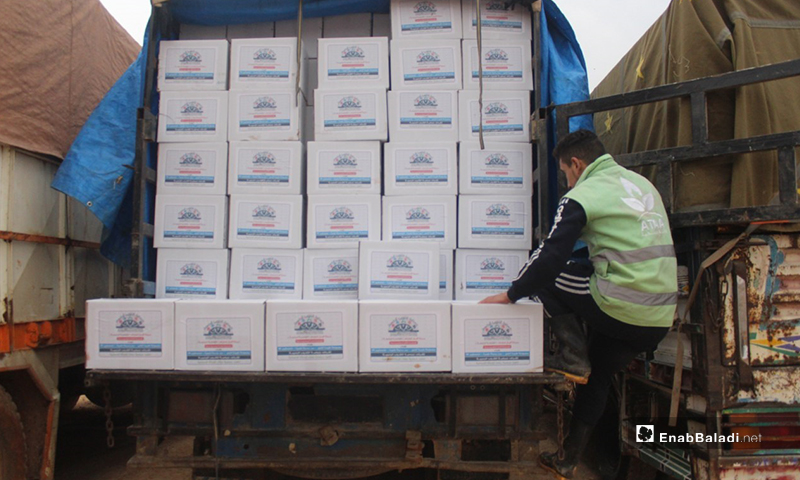Idlib – Shadia Tataa
“I moved with my wife and six children from our house at the beginning of the military campaign against my city almost a year ago, to settle in a house in the city of Idlib that has been ravaged by mildew and rot, and which I rented for 20,000 Syrian Pounds (18.6 USD).”
Sobhi Talal al-Khani, 39, described to Enab Baladi the poor humanitarian situation in the city of Idlib, with limited relief support, blaming the local council for the dreadful conditions.
Sobhi, a displaced Syrian from Khan Shaykhun city in the southern countryside of Idlib, has only had one basket since his displacement, despite the severe living conditions he is enduring.
Thousands of people in Idlib, who were displaced to escape raids carried out by the Syrian regime forces and its Russian ally, are facing the same fate as Al-Khani.
According to Mohamed al-Hallaj, director of the Syrian Response Coordinators Group, the number of displaced people in the city reached 417,633 since the start of the military campaign in the southern countryside of Idlib and Western Aleppo, until last February.
Most of these displaced persons are going through harsh conditions, with limited humanitarian aid provided by the organizations, compared to other displaced Syrians in camps or other cities and towns in northern Syria.
The council justifies: Organizations are responsible
The head of the Idlib City Council, Abdelqader Harmoush, confirmed to Enab Baladi that “the aid provided to the displaced people in Idlib is minimal compared to other towns and cities in northern Syria, due to the failure of some humanitarian organizations to support the Council.”
The task of distributing aid is usually assigned to the sheriffs responsible for overseeing eight neighborhoods in the area. At the same time, the need for supplies is not limited to the displaced people, as a large part of the residents there suffer from severe living conditions, according to Harmoush.
Sobhi and other displaced persons, whom Enab Baladi met in Idlib, also attributed the lack of food aid to the ineffective humanitarian work and the lack of coordination between the organizations in the city of Idlib.
A displaced person, from the city of Kafr Nabl, who spoke on condition of anonymity, told Enab Baladi that debts burdened many of his relatives and friends in the city of Idlib due to the lack of food aid and humanitarian assistance in general.
The Salvation government absolves itself
Humanitarian affairs coordinator in the city of Idlib, Bilel Al-Hussami, confirmed to Enab Baladi that the Humanitarian Aid Directorate of the Salvation Government had established camps and shelters for the displaced persons in Idlib in coordination with humanitarian organizations, in light of the severe displacement crisis that the region witnessed.
Humanitarian assistance was provided to the camps of Sheikh Mustafa, Al-Auja, Al-Yaman, al-Rotko, Harash Marten, the municipal stadium, al-Zaytoun, and other shelters. According to al-Hussami, all the displaced persons are receiving aid, including “all the heating materials they need (diesel and Pyrene), in addition to daily meals.”
Al-Hussami indicated that about 12,000 meals are distributed on a daily basis, in addition to powdered milk and food baskets, noting that each displaced family receives $ 120.
The Directorate also placed 195 families in refugee shelters located in the city and transferred 60 families, who have been staying in mosques, to Idlib’s municipal stadium.
The cases covered by the statistics mentioned above that al-Hussami revealed to Enab Baladi constitute a small proportion of what Idlib’s population and displaced newcomers really need; adding to that the medical, educational, housing and stability necessities, for which hundreds of thousands of residents and displaced people are still waiting.

